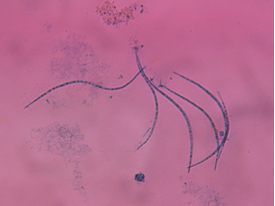In this post, we talk about two recently published papers dealing with the effects of fungicides on aquatic fungi that are key drivers in ecosystem functioning.
In aquatic systems, fungi play a central ecological role by “pre-digesting” leaf material making the energy and nutrients contained in the leaves available for other organisms such as insect larvae and crustaceans, which in turn are important food sources for animals at higher trophic levels such as fish. In addition, aquatic systems provide adjacent terrestrial ecosystems with energy and nutrients for example via the emergence of insects, providing food for amphibians, bats, and other predators. Therefore, any effects on the fungi involved in leaf litter decomposition may have far-reaching consequences for associated aquatic and terrestrial food-webs.
Our studies show that fungicides, which are under current use in Europe, can affect these fungi at concentrations that can be detected in the field, thus setting ecosystems at risk. In the course of these studies, we assessed both organic, i.e. synthetic, and inorganic fungicides, the latter group being used also for organic farming. Fungicides of both groups affected the composition and growth of leaf-associated fungal communities. Moreover, especially tebuconazole, featuring a mode of toxic action shared by approximately 20% of the synthetic fungicides approved for use in the EU, and copper affected fungal leaf decomposition at very low, field-relevant concentrations.
In our publications, we thus conclude that current EU regulations may allow fungicide concentrations that cannot be considered “environmentally safe” for leaf-associated fungi. As the application of fungicides is, however, considered an indispensable measure to secure crop production, fungicide risk assessment needs to be improved (e.g., by using test designs involving aquatic fungi) to safeguard the ecological integrity of detritus-based ecosystems.
The paper “Does the current fungicide risk assessment provide sufficient protection for key drivers in aquatic ecosystem functioning?” was authored by Jochen Zubrod, Dominic Englert, Alexander Feckler, Natalia Koksharova, Marco Konschak, Rebecca Bundschuh, Nadja Schnetzer, Katja Englert, Ralf Schulz, and Mirco Bundschuh and published in Environmental Science & Technology.
The paper „Inorganic fungicides as routinely applied in organic and conventional agriculture can increase palatability but reduce microbial decomposition of leaf litter“ was authored by Jochen Zubrod, Alexander Feckler, Dominic Englert, Natalia Koksharova, Ricki Rosenfeldt, Frank Seitz, Ralf Schulz, and Mirco Bundschuh and published in Journal of Applied Ecology. See also our post about this paper on The Applied Ecologist’s Blog.

